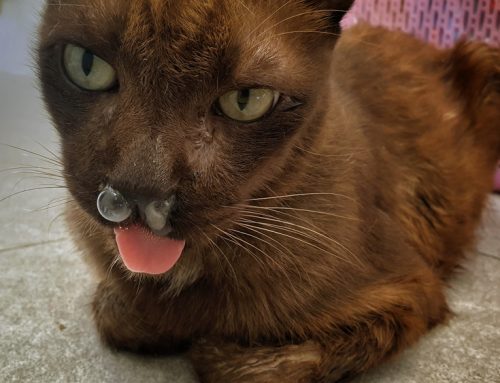Does your cat ever wheeze, cough, or seem short of breath? These symptoms can be alarming and might point to feline asthma—a chronic respiratory condition that, if left untreated, can severely impact your cat’s quality of life. At Town & Country Animal Hospital in Athens, Alabama, we specialize in the diagnosis and treatment of feline asthma, ensuring your pet stays healthy and comfortable.
Let’s dive into everything you need to know about feline asthma: its causes, symptoms, treatment, and prevention.
What Is Feline Asthma?
Feline asthma is an inflammatory condition of the lower airways, similar to human asthma. It causes airway narrowing due to swelling, mucus buildup, and muscle constriction, which can make breathing difficult. While asthma can’t be cured, it can often be managed effectively with the right care.
Want to know more about the tools we use to diagnose asthma? Visit our Advanced Diagnostics page.
Symptoms of Feline Asthma
Early recognition is key to managing feline asthma. Watch out for these common symptoms:
- Coughing or hacking: This might look like your cat is trying to cough up a hairball.
- Wheezing: A high-pitched sound, especially during exhalation.
- Labored breathing: You may notice your cat’s sides heaving or its abdomen working harder than usual.
- Open-mouth breathing or panting: Cats only pant under extreme stress or heat, so this could be a red flag.
- Lethargy: Cats with asthma may seem less playful or reluctant to exercise.
If your cat shows any of these signs, schedule an appointment immediately. Asthma attacks can escalate quickly, leading to a life-threatening situation.
When to Seek Emergency Care
If your cat is gasping for air, has bluish gums, or collapses, it’s an emergency. Contact us right away or visit our Emergency Services.
Causes and Triggers of Feline Asthma
Asthma in cats is triggered by hypersensitivity to allergens or irritants. Common triggers include:
- Environmental allergens: Pollen, mold, or dust mites.
- Household irritants: Cigarette smoke, scented candles, and aerosol sprays.
- Stress: Environmental changes or anxiety.
- Obesity: Overweight cats are at higher risk for respiratory problems.
Did you know that some breeds, such as Siamese cats, may be genetically predisposed to asthma? Learn more on our Breed-Specific Health Conditions page.
Diagnosis: How We Identify Asthma
Diagnosing feline asthma involves ruling out other conditions like heart disease or respiratory infections. Our diagnostic process may include:
- X-rays: To visualize airway narrowing or lung changes.
- Bronchoscopy: To examine the airways and collect samples.
- Blood tests: To rule out infections and check for eosinophilia, a marker of allergic reactions.
Treatment Options for Feline Asthma
Asthma management focuses on reducing airway inflammation and controlling symptoms. Treatment plans may include:
Medications
- Corticosteroids: To reduce inflammation. These can be administered via an inhaler or oral medication.
- Bronchodilators: To relax airway muscles during an asthma attack.
Lifestyle Adjustments
- Environmental modifications: Use air purifiers and avoid smoking or using strong-scented products near your cat.
- Weight management: Keeping your cat at a healthy weight can ease respiratory strain.
How We Can Help
At Town & Country Animal Hospital, we offer personalized treatment plans and guidance to ensure your cat receives the best care. Learn more about our Wellness Programs.
Preventing Asthma Flare-Ups

Prevention is a critical part of managing feline asthma. Follow these tips to keep flare-ups at bay:
- Clean regularly: Vacuum and dust frequently to minimize allergens.
- Improve air quality: Use HEPA filters and ensure good ventilation.
- Limit irritants: Avoid candles, sprays, and smoke around your cat.
- Stress reduction: Provide a calm environment and maintain a consistent routine.
Remember, regular veterinary check-ups can catch early signs of respiratory distress and keep your cat’s asthma well-managed.
Feline asthma is a manageable condition with the right care and attention. If you suspect your cat may have asthma, don’t wait—early intervention is crucial. At Town & Country Animal Hospital, our compassionate team is here to help your cat breathe easy and live their best life.
Contact us today to schedule an asthma evaluation or discuss your cat’s health needs. Together, we can ensure your feline friend stays happy, healthy, and by your side for years to come.
Additional Resources:
For trusted, expert veterinary care, call us at Town & Country Animal Hospital in Athens, Alabama. We’re here for you and your beloved pet every step of the way.







Leave A Comment